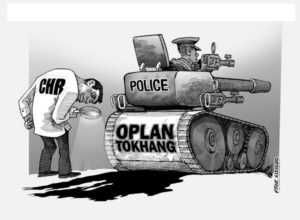
For them, there is presumption of regularity in the police operation so long as there is no strong evidence of summary execution on the part of police. Still, those who have become quite vigilant in monitoring extrajudicial killings aside from the rights groups, especially the parents who lost their loved ones in this war on drugs, 13 gunshot wounds is too much just to put one drug suspect.
Those arguing that the operation is above board would say that Acero, a drug addict who also peddled drugs, won’t be felled by a shot or two — unless it’s a kill shot straight in the head or heart — since his drug addled brain and body would be a lot more immune to the pain and blood inflicted by the bullets.
Then there are those who spread the rumors that Acero supposedly had an amulet (anting-anting) that protected him from the gunshots, forcing Tampus to fire at him repeatedly until he collapsed and fell dead.
The police had a more believable, though still to be verified account of the shooting incident as they explained that Tampus was smaller compared to Acero which forced him to shoot more.
Their claim that Tampus may have fired more shots at Acero out of anger is something that the Commission on Human Rights (CHR) should look into since police officers are supposed to be oriented and trained to exercise maximum control and compliance with the law when dealing with criminal suspects.
That said, Acero’s family can do little other than file their complaint with the CHR, whose resources and personnel are hard pressed to investigate and hold into account police officers who may have overstepped their bounds in the war on drugs.
Not to mention of course the still prevalent sentiment of those who believe that the reactivation of the police into the anti-drug campaign is long overdue and that drug suspects like Acero should be dealt with decisively.
The operation that claimed Acero’s life took place in the evening and in the weekend when police were not conducting their Oplan Tokhang which contrary to popular view, is more of an outreach initiative than an all-out police operation.
There is the belief that Tokhang provides the police with cover to track down and identify drug suspects before they are taken down, which is usually permanent. And what about the body cameras to be used by police to monitor their anti-drug operations?
The CHR has their work cut out for them in determining whether Acero’s death is the product of a legitimate police operation or is yet another in a long, growing line of extrajudicial killings that won’t let up anytime in the future.

